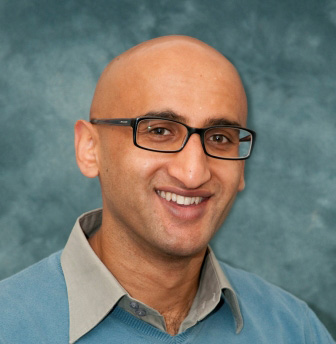Innovation
Innovation in the surveillance and early detection of hepatocellular carcinoma (HCC) to improve patient outcomes
Competition
NHS Cancer Programme – Innovation Open Call – Competition 2

Varinder Athwal, Principle Investigator for the REVISE HCC project, Consultant Hepatologist, Manchester University NHS Foundation Trust and Honorary Senior Clinical Lecturer at The University of Manchester, Manchester University NHS Foundation Trust / University of Manchester.
LinkedIn: /varinder-athwal-24a608102/
Twitter: @VSAthwal
Clinical Problem
Approximately 3,000 people are found to have HCC in the UK every year - Cirrhosis being the main risk-factor. 60% of HCC diagnoses are at later, non-curative stages, with less than half of patients alive after one year.
HCC is curable if detected at early stages (5-year survival >70%) but early diagnosis depends on regular surveillance of at-risk, asymptomatic populations.
Proposed Solution
The University of Manchester (UoM), Manchester University NHS Foundation Trust (MFT), Imperial College London (ICL) and Roche Diagnostics collaborated to conduct a study - REVISE-HCC - with the goal of improving the detection of HCC at curable stages.
The team implemented Roche’s GAAD navify® Algorithm across MFT hospitals, which provide specialist liver care to the Greater Manchester region. Unity Insights conducted the project’s independent evaluation.
The test, manufactured by Roche Diagnostics, uses AFP alongside another blood test (Elecsys® PIVKA-II), age and gender to calculate a risk score.
The REVISE-HCC project also undertook patient interviews and questionnaires to understand patient barriers to surveillance, and made pathway improvements as a direct result of the feedback received. For example, limited disease understanding or awareness of ongoing surveillance participation were consistently highlighted as reasons for poor surveillance, and changes were made to the information that is sent to patients to make the reason for surveillance clearer.
The majority of patients with cirrhosis are within working age so as well as saving lives, early detection and treatment results in getting people back to work more quickly and enhances productivity. Where possible, appointments are carried out in one day rather than multiple, which contributes to a carbon reduction due to a reduction in journeys to secondary care, and improves accessibility and ease of attendance.
Impact
-
946 patients have been assessed across 3 hospital sites at MFT since January 2024. 657 patients are enrolled in the REVISE-HDD study
-
1400 surveillance episodes have been conducted. 22 HCC diagnosed (67% early stage, 62% received curative treatment). 7 early-stage cancers detected by GAAD that would have been missed/diagnosed later. 1 referred for transplant
-
Budget Impact Analysis demonstarted cost saving in the HCC surveillance pathway, with considerable savings seen at the surveillance stage
-
A Cost Effectiveness Model demonstrated that GAAD results in budget savings while also resulting in a small QALY increase and a positive net monetary benefit
-
GAAD and GAAD+Ultrasound (USS) both generate better health outcomes and are cost-effective strategies vs standard care, also generating net monetary benefit
-
Patient adherence to the HCC surveillance pathway improved as a result of the technology implementation and pathway improvements from <50% to >70%
-
CE marked in-vitro diagnostic multivariate index assay
-
4 jobs created/safeguarded (UoM & MFT)
-
The promising outcomes from the initial pilot in Manchester demonstrate that the market potential and long-term commercial viability of GAAD is significant
-
Roche, MFT, and UoM were finalists at the 2025 HSJ Partnership Awards in the ‘Most Impactful Use of Technology on Clinical Practice’ category
-
An Implementation Toolkit was developed to provide stakeholders with a range of information and considerations to make when implementing GAAD at future sites, with the aim of streamlining the implementation process and maximising effectiveness of the solution
Industry quote
"Collaborating with the team at Manchester, we're leveraging the success and learnings of this study to help other NHS Trusts implement the GAAD algorithm, expanding access to timely diagnostics and potentially curative treatments for liver cancer patients."
Director of Access and Innovation at Roche Diagnostics UK and Ireland
"This is a great example of how the NHS can transform health outcomes and save lives through the use of cutting-edge technology and a greater focus on prevention. The stories of the patients who have already benefited from this new test highlight why it is so important that we diagnose and treat cancers at the earliest possible opportunity and I’m excited to see how it could be made more widely available in the future”
Regional Medical Director for NHS England
"I was shocked to find out that I had liver cancer, but also relieved that it had been found early and it hadn’t spread any further. I didn’t have any symptoms that would make me think that there was anything wrong, so I am grateful that the cancer has been caught early, where a number of treatment options are available to me. It isn’t until you’re in this position, that you truly realise how cancer can affect anyone, and detecting it early can save your life. I would encourage others to take part in this research trial, if given the opportunity, as this new technology will save lives. I am grateful to be in a position where curative treatment is available and I am now cancer free"
"“When I agreed to join the trial, I was being monitored routinely because of the presence of liver disease but the last thing that I thought I would ever develop was cancer. The GAAD test detected the cancer early I have been able to access one of several treatment options quickly, before the cancer had the chance to spread outside the liver. Early diagnosis and treatment has meant that I can also benefit from the care and support of an amazing multidisciplinary team. It has also meant that I have been given time to involve my family, especially my children, to navigate this journey together. Without the GAAD test, the diagnosis of cancer may have come too late for all of us”"
Date Published
October 2025

